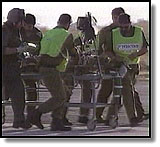
|
Arab Mini-summit Urges Israel to Stick to Peace ProcessThe leaders of Egypt, Jordan and the Palestinians have met in Cairo to discuss the faltering Middle East peace process.President Mubarak, King Hussein and Yasser Arafat issued a statement calling on Israel to refrain from what they called policies alien to the spririt of peace. They said the interim Israeli-Palestinian agreement should be implemented in full, and negotiations on the final status of the Palestinian territories resumed as soon as possible. Their statement also deplored terrorism. The three leaders were seeking to agree on a common approach to a visit to the Middle East by the American Secretary of State, Madeleine Albright, which is due later this week. With both Israeli and American officials now tending to regard the current peace agreements as a dead letter, the Arab leaders issued a clear signal that as far as they're concerned the Oslo accords are still the basis on which peace should move forward. They called for the rapid implementation of all the remaining clauses of that agreement under which Israel is supposed to conduct a phased withdrawal from further parts of the West Bank. Their appeal to Israel to refrain from actions which contradict the spirit of peace -- a reference to the inaugration of new Jewish settlements on disputed land -- reflects the Arab view that Israel is to blame for the current deadlock in the peace process. But they are also aware of Israel's security concerns, particularly in the wake of the latest bomb attacks in Jerusalem. With that in mind, the three Arab leaders also issued a condemnation of terrorism. Yasser Arafat's under strong pressure from Israel and the Americans to crack down hard on followers of the radical Islamic movement, Hamas, which said it carried out the bomb attacks. Shortly before King Hussein arrived for the Cairo meeting, it was announced that Jordanian security officials had detained the Hamas spokesman in Amman, Ibrahim Ghosheh -- another apparent gesture in the direction of Israeli concerns.
Israel Ponders Withdrawal from LebanonThere have been renewed calls in Israel for a withdrawal from southern Lebanon following the deaths there last week of at least eleven Israeli soldiers.
The mounting cost of Israel's Lebanon operations has provoked renewed national debate over its Lebanon policy, including whether or not to abandon the zone it has occupied in the south since 1985. Israel's foreign minister, David Levy, declared that the people and government of Israel wanted to leave Lebanon. Speaking to Israel Radio, he reiterated Israel's position, saying it had no territorial ambitions in Lebanan but needed to protect its northern communities. Both the prime minister, Binyamin Netanyahu, and defence minister have said Israel's operations in Lebanon, including the security zone, would have to be reviewed. But Mr Netanyahu ruled out a unilateral withdrawal, saying Lebanese guerrillas would only move into Israel itself.
|
Diana, Princess of Wales, 1961-1997
Conference 97
Devolution
The Archive
News |
Issues |
Background |
Parties |
Analysis |
TV/Radio/Web
Interactive |
Forum |
Live |
About This Site
News |
Issues |
Background |
Parties |
Analysis |
TV/Radio/Web
Interactive |
Forum |
Live |
About This Site
© BBC 1997 |
politics97@bbc.co.uk |

